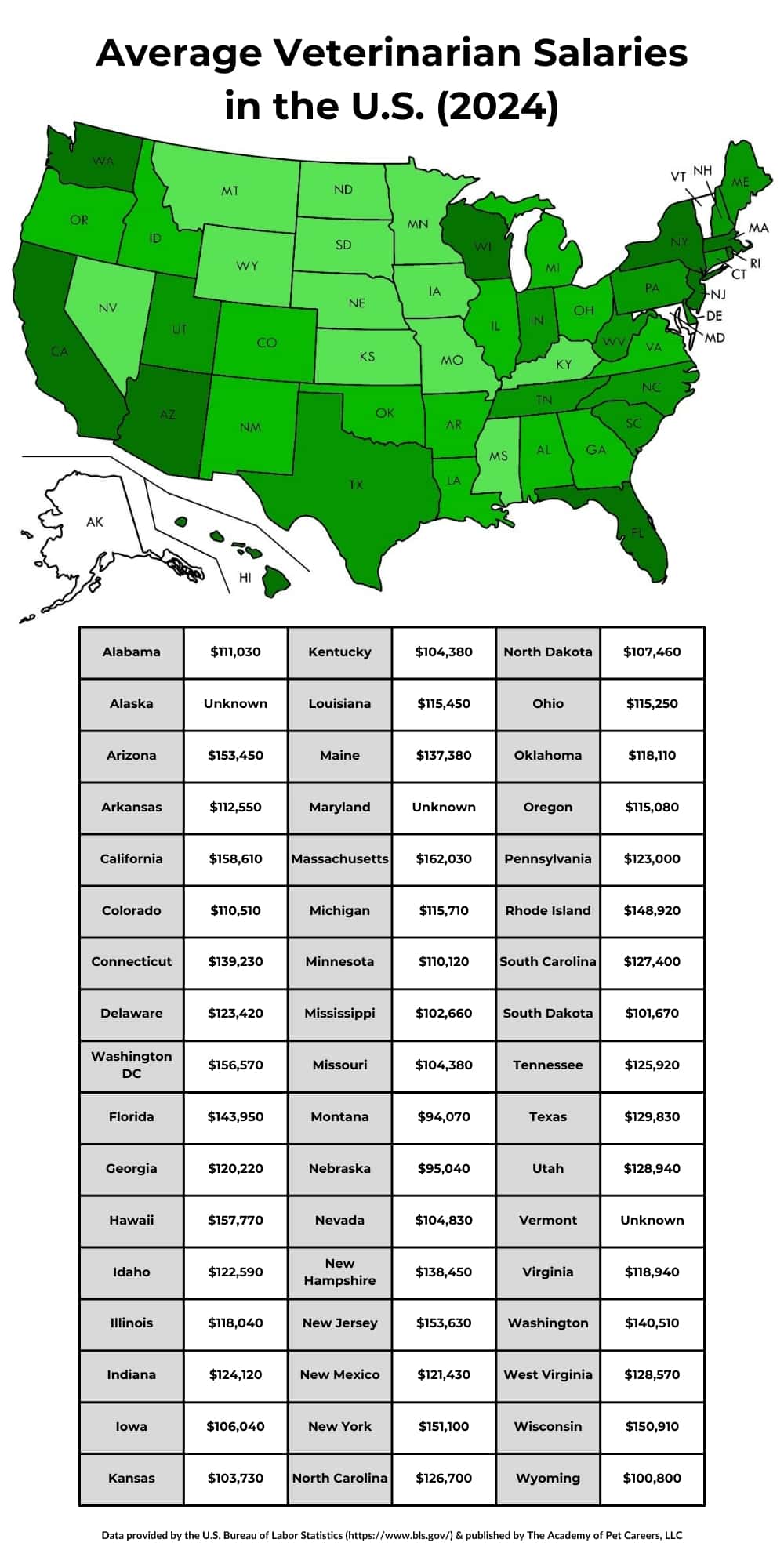Average Veterinarian Salary in 2024: How Much Can Veterinarians Make

Embarking on a journey into veterinary medicine? Let's explore the average veterinarian salary, a figure that reflects not just years of dedication and study, but also the profound impact of these professionals on animal health and welfare.
In this comprehensive exploration, we will uncover the myriad factors that influence veterinarian incomes, from educational investments and geographical variances to the nuances of specialization.
Through an insightful examination of benefits, career outlooks, and strategies for maximizing earnings, this article offers a holistic view of the veterinary profession's financial landscape. Join us as we navigate through the challenges and opportunities that shape the economic realities of those committed to caring for our animal companions.
Factors Influencing Veterinarian Salaries
Education and Certification Requirements: The pathway to becoming a veterinarian is arduous and expensive, involving extensive education and certification. From a Doctor of Veterinary Medicine (DVM) degree to licensure exams, the initial investment is significant. These requirements set the stage for a rewarding career, both personally and financially.
Experience Level and Years in Practice: Like many professions, experience pays. Newly minted veterinarians might start on the lower end of the salary spectrum, but with years, expertise, and a solid reputation, their income substantially grows.
Geographic Location: Salaries vary widely across different regions, influenced by the cost of living and local demand for veterinary services. Urban areas often offer higher salaries than rural settings, though the latter might come with a lower cost of living.
Type of Practice: The choice between small animal, large animal, exotic, or research practices impacts earnings. Small animal practitioners generally earn more, given the higher demand and clientele willing to spend on pet care.
Employment Type: Working in private practice usually yields a higher salary compared to positions in government or non-profit organizations. However, the latter might offer more in terms of benefits and work-life balance.
Average Salary Range for Veterinarians
Nationally and internationally, salaries for veterinarians can vary greatly. In the United States, for instance, the average annual salary hovers around $135,000 according to the U.S. Bureau of Labor Statistics (bls.gov), with significant variation depending on factors previously mentioned. Specialization can further boost income, with veterinary surgeons and dermatologists often topping the salary charts. See below for a breakdown of income potential by state in the U.S..

When considering the hierarchy within veterinary practices, it's crucial to understand the salary distinctions among veterinarians, veterinary assistants, and veterinary technicians (vet techs). Veterinarians, requiring extensive education and licensure, understandably command the highest salaries within this spectrum. On the other hand, veterinary assistants, who provide supportive care and assistance without the need for formal certification, typically earn the least. Veterinary technicians, falling in between, require a 2-year associate degree and must pass a credentialing exam, leading to higher earnings than assistants but still significantly less than veterinarians.
While the average veterinarian salary in the United States might hover around $135,000, vet techs can expect to make in the ballpark of $45,000 (bls.gov) depending on experience and location, and veterinary assistants might see figures closer to $37,000 (bls.gov). These differences highlight not just the varying levels of responsibility and education required but also the potential career progression paths within veterinary practices for those starting at lower-tier positions.
Benefits and Other Compensation
Besides the base salary, many veterinarians receive a comprehensive benefits package, including health insurance, retirement plans, and paid leave. Some practices also offer allowances for continuing education, professional memberships, and even profit sharing, underscoring the value they place on their staff's growth and satisfaction.
Career Outlook for Veterinarians
The veterinary field is experiencing steady growth, with the U.S. Bureau of Labor Statistics projecting a 16% increase in employment from 2019 to 2029. This growth is fueled by the continued expansion of pet care services and advances in veterinary medicine, suggesting a bright future for aspiring veterinarians.
Tips for Maximizing Salary Potential
Continuing Education: Pursuing additional certifications and specializations can significantly impact a veterinarian's salary. Staying abreast of the latest in veterinary medicine not only enhances skills but also marketability.
Networking: Engaging with professional associations and attending industry conferences can open doors to higher-paying opportunities and private practice partnerships.
Private Practice: While starting or joining a private practice entails risk, it also offers the potential for higher income through ownership and entrepreneurial endeavors.
The Cost of Schooling to Become a Veterinarian
The journey to becoming a veterinarian involves a significant financial investment, primarily due to the cost of veterinary school, which varies based on the institution's public or private status and the student's residency.
In the United States, in-state students at public veterinary colleges can expect annual tuition costs ranging from $20,000 to $30,000, while out-of-state and private school students may face expenses exceeding $50,000 per year. When accounting for additional expenses such as books, supplies, living costs, and potential travel for clinical rotations, the financial commitment becomes even more substantial over the typical four-year duration of veterinary programs. Despite this, many students rely on financial aid, scholarships, and loans to cover these costs, often graduating with a considerable debt load.
While the allure of a high salary is undeniable, a career in veterinary medicine is ultimately about passion and dedication. The financial rewards, influenced by a myriad of factors, are just one piece of the puzzle.
Frequently Asked Questions
The cost of veterinary school can be a significant barrier, leading to substantial debt. However, with careful financial planning and career progression, veterinarians can not only manage their debt but also enjoy a lucrative career, especially if they specialize or enter into private practice.
Yes, veterinarians working with companion animals typically earn more than those working with livestock or wildlife, largely due to the higher demand and willingness of pet owners to spend on healthcare.
Veterinarians can negotiate better terms by showcasing their experience, specializations, and the value they bring to a practice. Being open to discussions about performance bonuses, profit sharing, and other forms of compensation can also be beneficial.
Opportunities include consulting, telemedicine, writing for industry publications, and participating in veterinary pharmaceutical research. These avenues can supplement income and offer varied career experiences.
Veterinarians often earn less than human healthcare professionals, such as physicians and dentists. However, comparing within the realm of jobs requiring similar levels of education, veterinarians hold a competitive position, especially considering the varied and fulfilling nature of their work.
 Author - Joseph Schifano
Author - Joseph Schifano
Joseph Schifano is the owner and President of The Academy of Pet Careers. With over 20 years of experience working in the pet field, managing large scale pet care businesses, he has experience in every facet of the industry. Joseph's focus is primarily on the business of pet care but his passion is in understanding animal behavior how a dog's brain works so we can improve the care we provide as pet professionals. He is a huge advocate for Pet Empowerment and Force Free training methods. Read more in Joseph's full bio.
